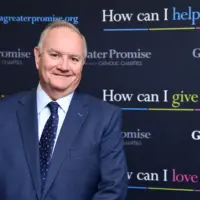About Villa Maria of Frederick County – Catholic Charities
Known for its Civil War history, Frederick, Maryland also features Villa Maria of Frederick County – Catholic Charities. For more than 100 years, Catholic Charities has provided behavioral and social services for youth, adults and families in six counties across Maryland. You can participate in comprehensive outpatient care to reach your recovery goals at their Frederic County location.
With outpatient care, you can live at home and attend treatment while maintaining daily responsibilities. Their programs increase accessibility with virtual care and over 100 school partnerships to reach youth. You can participate in treatment best practices, including assessments, individual, group and family therapy, peer coaching, medication management and more. These approaches can help you get to the root of addiction and gain the tools to sustain sobriety.
Breaking Barriers to Personalized Care
What stands out most to me is their dedication to breaking barriers to quality treatment. Their clinics and community and school-based partnerships allow them to offer care for thousands of Marylanders in need. They work with you to reduce barriers to care, such as distance, homelessness, poverty and lack of transportation. That way, you can focus solely on recovery.
Strengthening Family Relationships
Another great feature I noticed was they offer parent-child interaction therapy. Addiction and behavioral health conditions can tear families apart. They help you rebuild essential bonds with your children to nourish a strong relationship. You and your child can benefit from learning healthy ways to engage.
Comprehensive Treatment That Fits Any Budget
I also think it’s nice that they provide care regardless of finances. They accept Medicaid, Medicare and many private insurers. Even if you don’t have insurance, you can still get the help you need. You can access a sliding fee discount program based on family size and income. That way, finances won’t stand in the way of receiving quality care.
Latest Reviews
Rehab Score
Other Forms of Payment
Medicaid is a state based program that helps lower-income individuals and families pay for healthcare. Medicaid covers addiction treatment so those enrolled can use their coverage to pay for rehab. When a program accepts Medicaid the client often pays very little or nothing out of their own pocket.
Addiction Treatments
Levels of Care
Outpatient Programs (OP) are for those seeking mental rehab or drug rehab, but who also stay at home every night. The main difference between outpatient treatment (OP) and intensive outpatient treatment (IOP) lies in the amount of hours the patient spends at the facility. Most of the time an outpatient program is designed for someone who has completed an inpatient stay and is looking to continue their growth in recovery. Outpatient is not meant to be the starting point, it is commonly referred to as aftercare.
Treatments
Mental health rehabs focus on helping individuals recover from mental illnesses like bipolar disorder, clinical depression, anxiety disorders, schizophrenia, and more. Mental health professionals at these facilities are trained to understand and treat mental health issues, both in individual and group settings.
Clinical Services
Cognitive Behavioral Therapy (CBT) is a therapy modality that focuses on the relationship between one's thoughts, feelings, and behaviors. It is used to establish and allow for healthy responses to thoughts and feelings (instead of unhealthy responses, like using drugs or alcohol). CBT has been proven effective for recovering addicts of all kinds, and is used to strengthen a patient's own self-awareness and ability to self-regulate. CBT allows individuals to monitor their own emotional state, become more adept at communicating with others, and manage stress without needing to engage in substance abuse.
Dialectical Behavior Therapy (DBT) is a modified form of Cognitive Behavioral Therapy (CBT), a treatment designed to help people understand and ultimately affect the relationship between their thoughts, feelings, and behaviors. DBT is often used for individuals who struggle with self-harm behaviors, such as self-mutilation (cutting) and suicidal thoughts, urges, or attempts. It has been proven clinically effective for those who struggle with out-of-control emotions and mental health illnesses like Borderline Personality Disorder.
Research clearly demonstrates that recovery is far more successful and sustainable when loved ones like family members participate in rehab and substance abuse treatment. Genetic factors may be at play when it comes to drug and alcohol addiction, as well as mental health issues. Family dynamics often play a critical role in addiction triggers, and if properly educated, family members can be a strong source of support when it comes to rehabilitation.
Group therapy is any therapeutic work that happens in a group (not one-on-one). There are a number of different group therapy modalities, including support groups, experiential therapy, psycho-education, and more. Group therapy involves treatment as well as processing interaction between group members.
In individual therapy, a patient meets one-on-one with a trained psychologist or counselor. Therapy is a pivotal part of effective substance abuse treatment, as it often covers root causes of addiction, including challenges faced by the patient in their social, family, and work/school life.
Trauma therapy addresses traumatic incidents from a client's past that are likely affecting their present-day experience. Trauma is often one of the primary triggers and potential causes of addiction, and can stem from child sexual abuse, domestic violence, having a parent with a mental illness, losing one or both parents at a young age, teenage or adult sexual assault, or any number of other factors. The purpose of trauma therapy is to allow a patient to process trauma and move through and past it, with the help of trained and compassionate mental health professionals.
Staff

Bill McCarthy
Executive Director

William J. McCarthy Jr.
Executive Director

Sarah Beckwith
CFO

Ashley Valis
COO

Jocabel Michel Reyes
Chief Development Officer

Amy N. Collier
Director for Community Services

Mary Choplick
Director for Senior Services

Kevin M. Keegan
Director for Family Services
Contact Information
300 West 9th Street
Frederick, MD 21701